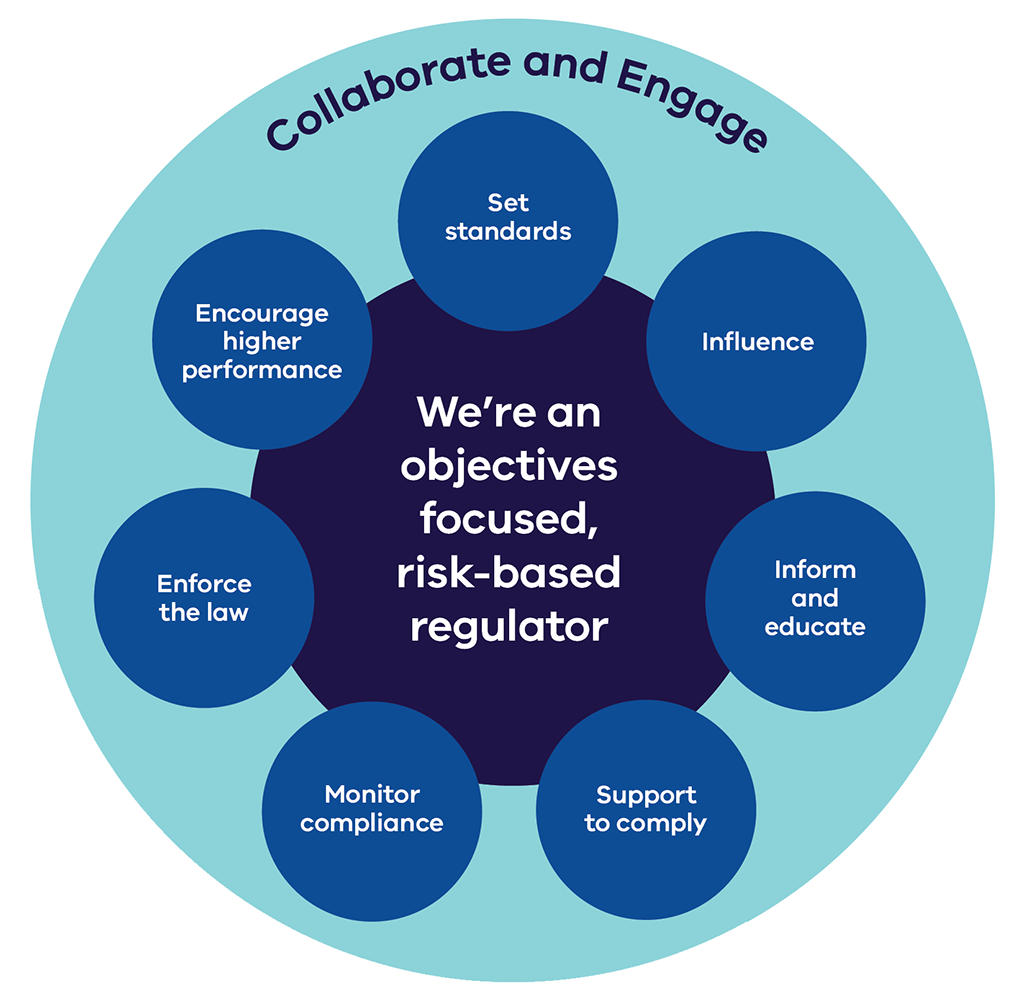Introduction
Recycling Victoria
Recycling Victoria was established to provide leadership, stewardship and oversight of waste, recycling and resource recovery services. This work is directed by statutory objectives that focus effort towards building strong and resilient service provision from the sector, with continued market investment and growth.
Recycling Victoria uses a range of market focused and regulatory services aimed at strengthening and growing the sector - from the provision of market information and intelligence, long-term infrastructure planning for the sector, to specific regulatory programs and functions.
This Compliance and Enforcement Policy focuses on Recycling Victoria’s role as the state’s regulator for the provision of waste, recycling and resource recovery services, to guide and inform its regulatory functions under the Circular Economy (Waste Reduction and Recycling) Act 2021 (CE Act). These regulatory tools and powers are directed towards improving reliability and integrity of waste, resource recovery and recycling services, to enable more growth and investment in the sector.
In administering our functions, we work alongside our partners including the Environment Protection Authority Victoria (EPA), Sustainability Victoria, and the circular economy policy area of the Department of Energy, Environment and Climate Action (DEECA). We work closely together to share data, coordinate public messaging and in our operations and compliance activities. Our partnerships may also include working with other Victorian regulators in respect to undertaking compliance and enforcement actions.
Our regulatory context
Our Regulatory Strategy outlines our regulatory role and the key regulatory harms and priorities that we will focus on until 2026 to deliver on our strategic objectives.
To meet our strategic objectives we apply a consistent regulatory approach (illustrated in Figure 1):
- a focus on collaborating and engaging
- regulating in a way that is objectives-focused and risk-based
- building capability in the waste, recycling and resource recovery sector.
Figure 1: Recycling Victoria's regulatory approach.
About this Compliance and Enforcement Policy
This policy sets out how we exercise our regulatory powers at Recycling Victoria to support and direct our regulated entities to comply with obligations under the CE Act. It outlines the principles and criteria that underpin our decision-making and guide us in exercising our judgment and discretion in our compliance and enforcement activity.
This policy describes how we:
- encourage voluntary compliance with the law
- make use of a range of regulatory tools to minimise and prevent risk
- take account of culpability and harm in our enforcement approach.
Our regulatory principles
Recycling Victoria’s compliance and enforcement activities are guided by 8 best practice regulatory principles.
In administering the CE Act and regulations, Recycling Victoria will have regard to the principles set out in the CE Act and our Regulatory Strategy. Where we have regulatory discretion, these principles will guide our actions and decisions:
- Objectives focused
- Risk based and precautionary
- Intelligence led and evidence based
- Proportionate and graduated
- Consistent and predictable
- Transparent and accountable
- Timely
- Systems oriented.
Objectives focused
Our regulatory approach aims to achieve the clearly defined objectives as set out in our Strategic Plan. This means we focus on our impact, rather than just on setting and following rules.
Risk based and precautionary
Our effort is focused on addressing the risks that pose the greatest harm to the outcomes and objectives we are seeking to achieve. We identify, monitor and assess strategic and emerging risks to inform our regulatory actions and decisions. Our sector risk and market intelligence functions support us to identify risks in the sector and inform how we prioritise our efforts to prevent, mitigate and manage sector risks.
Intelligence led and evidence based
We draw on data and intelligence including from local government, community, industry and other state and national government agencies, to identify emerging risks and opportunities. We use evidence and insights to inform our decisions and actions.
Proportionate and graduated
Our regulatory actions to support compliance or respond to non-compliance are proportionate to the harm or risk of harm that we are addressing, the characteristics of regulated entities and their responsiveness to cooperating with Recycling Victoria in meeting their obligations.
Consistent and predictable
We uphold fairness, equity and consistency in every case we handle. To achieve this, we provide our officers with the necessary tools and training to apply the law consistently in line with the CE Act, regulations, and Recycling Victoria policies.
Transparent and accountable
We are committed to being transparent and accountable in exercising our regulatory powers. We share information with the public about our role, responsibilities and activities and will outline the reasons for our decisions with regulated entities.
Timely
We listen, communicate, respond and act in a timely fashion. We endeavour to provide sufficient time for regulated entities to comply and will respond swiftly to non-compliance that presents a significant risk of harm.
Systems oriented
We consider system-level risks, interventions and consequences. We take an integrated approach to our actions and decisions related to the circular economy and have regard to the broader systems that our sector is part of.
Our approach to compliance and enforcement
At Recycling Victoria, we work with our stakeholders to improve compliance with the requirements under the CE Act. We take a risk-based and proportionate approach.
Recycling Victoria’s compliance and enforcement actions aim to:
- raise awareness of the law and achieve voluntary compliance
- alert regulated entities to the consequences of non-compliance
- address harmful or non-compliant activity
- attain and sustain future compliance
- hold offenders to account.
In designing our regulatory schemes and planning our compliance and enforcement activities, we draw on our regulatory principles and aim to put a considered mix of our resources into:
- preventative work, such as raising awareness of regulatory requirements and, where possible, supporting entities to comply
- monitoring and assessing compliance with legislated obligations, standards, regulations, licences, directions and notices
- responding to risk and harmful events as they arise.
Recycling Victoria is an objectives-focused risk-based regulator. We undertake strategic assessments to understand where key risks reside in the particular functions and schemes we administer. Where we determine risk-based priorities for a scheme or function, we may communicate these priorities through statements of regulatory intent to increase transparency and accountability. These statements of regulatory intent will guide our compliance and enforcement efforts and may inform how we respond to non-compliance.
We use a range of approaches to encourage and require compliance with the laws we are responsible for applying.
Support to comply
Recycling Victoria plays a key role in ensuring the waste and resource recovery sector is strong and resilient. We do this by identifying and monitoring sector risks and improving how they are managed and mitigated. Our annual publications like the Circular Economy Risk, Consequence and Contingency Plan and Circular Economy Market Report increase the information available to the sector to plan and perform better.
We are committed to providing clear and accessible information to our regulated entities to support an understanding of the law and how to comply with it. We utilise the Recycling Victoria website and other communication channels to ensure general and specific information about the standards and schemes we administer is readily available.
We know that most people want to comply with the law and we seek to enable voluntary compliance by supporting regulated entities to improve their understanding of their obligations and by providing practical and constructive support and advice.
We publish standards and guidelines on what the law requires and how we will interpret and apply the law.
Where appropriate and needed, we can provide practical, constructive and specific advice to interpret our guidance for new or unique situations.
Monitor compliance
Recycling Victoria monitors compliance with the CE Act. Compliance monitoring draws on information and intelligence we gather through our operations and from partner agencies, as well as the insights of our stakeholders and the community.
We can also conduct inspections and audits to monitor compliance with the law and with licences we have granted.
Assess non-compliance and risk
Recycling Victoria will assess suspected contraventions of the law that we identify through our work or when reported or referred to us. In making an assessment we may make preliminary enquiries, undertake desktop reviews or request information from other agencies.
We prioritise our regulatory activities to areas of greatest risk and those where we can make the biggest improvements to the provision of waste, recycling and resource recovery services, sector resilience and circular economy outcomes.
This risk based approach recognises it is not appropriate or practical to take compliance and enforcement action in response to every possible or suspected breach and enables the most effective use of our resources.
When Recycling Victoria has reason to believe it is warranted, we may conduct investigations. Investigations may involve (but are not limited to) inspections, interviews, seeking expert audits or issuing information gathering notices.
Enforce the law
Based on our assessments and investigations, Recycling Victoria will determine if and what action is appropriate and will be evidence-based and proportionate in taking enforcement action.
We will close the loop by notifying, as appropriate, regulated entities and those who refer matters to us, about the outcomes of investigations and any enforcement action.
Being transparent about our regulatory activities is important to:
- promote confidence and trust in Recycling Victoria’s regulatory role
- deter future instances of non-compliance
- educate stakeholders on the standards expected of service providers.
Our response to non-compliance
In responding to non-compliance, we consider factors such as the risk of harm, the characteristics of the regulated entity and systems considerations.
Our response to non-compliance is proportionate and graduated ranging from encouragement, enabling and educating entities to comply, through to using the full force of the law for willful and repeated non-compliance.
The Head, Recycling Victoria has a range of statutory powers and regulatory tools that can be used to respond to non-compliance as well as to prevent risks or disruptions to essential waste, recycling or resource recovery services.
The Head, Recycling Victoria can use, or delegate, regulatory powers, as well as appoint authorised officers with powers of entry and inspection. Recycling Victoria’s regulatory tools range from informal resolution through to sanctions and court action. The tools can also be used in combination or progressively.
The broad range of tools available to us ensures that we have the flexibility to respond in a way that is targeted and proportionate to the seriousness of the problem. Additionally, if there is a contract in place, this may in some circumstances provide a more effective lever than a formal regulatory response.
Our decision making
We exercise our discretion when applying enforcement tools. In applying the law in a way that is procedurally fair and in the public interest and deciding what action to take, we will consider the actual or potential impacts to waste, recycling or resource recovery service continuity. We will also assess:
- the seriousness of offending and the degree of impact to the circular economy system, such as the level of market distortion or commercial advantage obtained
- how widely understood the obligation was and if the regulated entity’s actions were intentional or reckless
- the compliance history of an offender including (if relevant) with other regulators
- the duration and extent of the non-compliance
- the actions of the regulated entity, including the degree to which the entity has attempted to put in place measures to prevent the failure of, or disruption to, a waste, recycling or resource recovery service.
Recycling Victoria may also take other practical or strategic considerations and criteria into account when determining the most appropriate response. These may include:
- whether there is a contract in place that provides a more effective lever than a regulatory response
- whether it is necessary to act swiftly to mitigate serious risks
- whether prosecution in a criminal court or proceedings in a civil court is in the public interest or if alternative measures may be more appropriate to provide corrective outcomes
- if matters are more appropriately or effectively dealt with by another agency
- whether a systems-level intervention is more appropriate.
Remedy
Our formal responses to remedy a non-compliance are based on evidence, follow appropriate investigations and are consistent with the law and Recycling Victoria’s policies and procedures.
Recycling Victoria’s tools to remedy a non-compliance or to prevent a risk from eventuating include:
- letters of advice
- letters of warning
- improvement notices
- prohibition notices
- show cause notices
- directions from the Head, Recycling Victoria
- authorised officer directions
- licence conditions.
Sanctions
Potential sanctions that Recycling Victoria can take or pursue are:
- infringement notices
- licence suspension, revocation or cancellation
- enforceable undertaking
- civil proceedings
- criminal prosecution
Feedback
We are committed to improving our services and encourage feedback about your experience with us. You can contact us at: Contact Recycling Victoria | Victorian Government (www.vic.gov.au).
Complaints
If you are unhappy with our response to your feedback, you can also make a complaint to DEECA at: Contact us (deeca.vic.gov.au) or in writing to integrity@decca.vic.gov.au.
Victorian Ombudsman
The Victorian Ombudsman has the power to investigate complaints about state and local government authorities. Contact the Victorian Ombudsman.
Victorian Civil and Administrative Tribunal
Certain decisions taken by Recycling Victoria in exercising its regulatory functions are reviewable by the Victorian Civil and Administrative Tribunal. The list of reviewable decisions is outlined in Part 8 of the CE Act and are subject to time limits.
Updated




